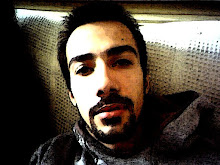Later browsing my notes I discovered that our firend had also given us the name of a folk artist, so we started looking for him hoping that he might know how to find the shaman. We found the home of the folk artist easyly, but only his wife -a kind old lady was- at home. She told us that the shaman lived in the outskirts of Baolongshan and helped us to find a ride. It took more than an hour to find the shaman's house though the adress the lady had given prooved to be correct. In this part of the township people lived in chinese-style adobe houses with 2-4 rooms and with a big garden. Where the build-up area ended we could see nothing but cornfields and a few poplars in the distance. As we got off the three-wheeled vehicle that had taken us there, we bumped into a small group of Mongol girls. The oldest one - she was in her mid-twenties- told us that the shaman was not at home but he would probably come back in an our or two and inveted us to her home that was just 50 m away. She spoke with a very thick and -to us- very funny Khorchin accent but it wasn't difficult to understand her. She had a chinese husband who could speak a little Mongolian too, and they had a small kid. In their living room we discovered a poster on the wall with Christian symbols. They told us that they followed the Christian faith and that they have a recognizable Christian community in Tongliao. The girl said she didn't like the shaman for in her opinion she was an unprincipled person and she didn't believe in shamanism what she regarded as sheer superstition. Nevertheless she didn't want to dissuade us from meeting him.
Hours passed and the shaman still hadn't come, so we decided to go back to our hotel and come back tomorrow.
Hours passed and the shaman still hadn't come, so we decided to go back to our hotel and come back tomorrow.





